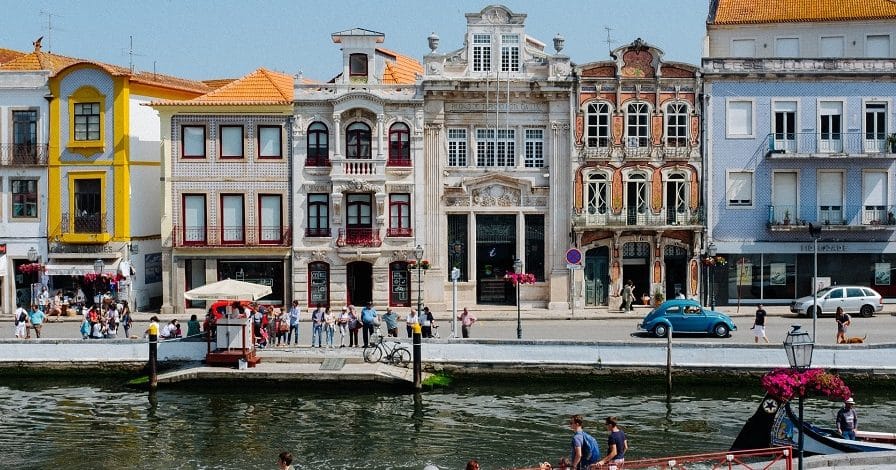There are a variety of reasons why more and more people decide to move to Portugal. For many, it’s the relaxed and healthy lifestyle and rich history with the feel of a perpetual vacation. For others, it’s the highly cherished social cohesion that keeps communities safe. But let’s explore the practical side of what this small country have to offer to expats that makes it stand out and outrank other European countries.
If you’re considering moving to Portugal, it’s important to understand how the country measures up against other European countries. This makes the process of deciding whether it’s the right move for you an easier one.
1. Portugal Cost of Living
For many, the cost of living in Portugal is one of the most important aspects to consider before deciding to move. The great news is that this country is relatively affordable when you compare the cost of living in Portugal vs USA. Consumer prices including rent are about 40% lower in Portugal compared to the United States. For instance, a $50 meal in the US will cost you around $30 in Portugal. A $60 monthly internet bill in the U.S. costs roughly half as much in Portugal, around $32. The low cost of living in Portugal also doesn’t come at the expense of a good quality of life — Portuguese food is great and the internet is super fast.
Housing in Portugal typically represents the largest chunk of your monthly budget, as it is the case virtually anywhere. The cost of renting a home can be anywhere between $400 and $1,800 or more if you are looking at large homes. Properties in the center of Portugal and in smaller cities and towns are generally very low, while rentals in big coastal cities cost significantly more. For instance, the cost of living in Lisbon is higher, therefore renting here will cost on average around $650 to $1,200, depending on the neighborhood. Porto is similarly priced. These rates are much lower compared to other European cities including Barcelona ($800 to $1,500+), London ($1,900 to $3,000+) and Rome ($900 to $2,000+).
Other expenses such as electricity, water and Internet are all very affordable. Together, these services average around $100-$140 per month.

Portugal is generally seen as one of the most affordable countries to live in Europe, while at the same time being one of the most beautiful and desirable destinations for expats in Southern Europe, rivaling the likes of Spain and Italy. When you compare typical expenses in Portugal versus other Southern European countries, Portugal comes well ahead of Spain, Italy and France, in terms of affordability.
2. Safety in Portugal
According to the Global Peace Index, Portugal is the fourth safest country in the world. This index measures the peacefulness of countries made up of 23 indicators, including low crime rates and non violent demonstrations, minimal incidences of terrorist acts, cooperative relations with neighboring countries and a stable political setting, among others. The lower the score, the more peaceful the country. Portugal beats three other European Union countries in the top 10: Ireland, Austria, and Slovenia.

3. Healthcare in Portugal
In general, Europe has some of the best healthcare systems in the world. According to the Health Care Index, Portugal’s healthcare system ranks among the top 25 countries and earns particularly good marks for the quality of its infrastructure. Portugal currently spends around 9.1% of its GDP on healthcare. Around 70% is public expenditure and 30% is private expenditure.
Portugal’s healthcare system is called the Serviço Nacional de Saúde (SNS). It provides free healthcare to all Portuguese citizens and residents living in Portugal. The public hospitals are modern and well-equipped, and many doctors speak English. You also have the option to purchase private insurance for additional perks and services.
4. Housing in Portugal
Portugal offers a highly developed and mature real estate market that meets the best European standards in terms of quality and dynamism. Whether you want to live in the heart of a cosmopolitan city or enjoy a relaxed lifestyle by the sea, the country has fantastic real estate opportunities. In fact, property prices in the country remain on average lower compared to most other European countries.

5. Friendly Portuguese Communities
Not all European countries are open to welcoming expats into the country – especially when the expats cannot speak their language yet. However, Portugal is known for their incredibly friendly and open-minded people. The Portuguese are eager to help where they can and enjoy welcoming people into their homes.
6. Portugal Climate
You can enjoy a fantastic Mediterranean climate, as Portuguese temperatures’ maximum average hovers around 70 degrees Fahrenheit, which is pretty much the definition of perfect weather. Most of the country basks in beautifully warm and sunny summers, with moderate and foggy winters in the North. On average, Lisbon gets 2,806 hours of sun every year. This is an excellent figure compared to Paris (1,662 hours), London (1,633 hours) and Berlin (1,626 hours).

7. Portuguese Culture
Portugal is Europe’s oldest nation, and its history goes back to the country’s founding year of 1143. Compared to many other European countries that have diversified and lost some of their historical tradition, Portugal has always celebrated its history and deep-rooted traditions. In most cities and towns, special occasions and public holidays are celebrated annually by hosting ‘festas‘. During these events, different forms of art, craft, food, wine, literature, and theatre forms are celebrated.

Portugal also has a huge culinary tradition. Portuguese meals involve lots of lengthy, passionate conversations. Seafood is highly popular, and the Portuguese have hundreds of ways to cook fish, from salt cod to charcoal-grilled sardines. Other staples include homemade bread, meat and fresh fruits and vegetables. Lamb, pork, rabbit, beef and chicken are all common sources of meat. Of course, sweets and pastry shops are also incredibly popular. People travel from all over the world to taste the special pastel de nata, a delicious Portuguese egg tart pastry.
8. Travel inside and outside of Portugal
Portugal may be situated at the most western tip of Europe, but the country allows for easy traveling to all other European countries. Air travel tickets are very affordable to Spain, Italy, Greece, France and England. The country’s location on the Western coast of Europe make it a particularly convenient location for Americans. Lisbon is only a 7-hour direct flight to and from New York, making air travel easy to and from the United States.
For in-land traveling, Portugal has a world-class train system called the Comboios de Portugal, as well as excellent bus services with low average rates compared to the rest of Europe. Using these systems allows for easy access to most big cities in the country.

9. Family-Oriented
Moving to Portugal from U.S. is an easy decision for many couples and families because Portugal is strongly family-orientated and very protective of family life. Unlike in some other countries, it is very common to see two, three or even more generations living together in the same house. Special occasions, holidays and birthdays are all celebrated together.
Moving to Portugal as a family is not difficult, because this country has a well-organized public childcare system, from day care centers called creches for children under three where they learn and play in groups of ten or so, kindergartens for ages three to five, the equivalent of U.S. preschools, where the groups go up to 20-25 children, to schools for six year-olds and up. The Portuguese state also offers a monthly family allowance for all children to help with raising expenses. The amount of the allowance varies depending on the kids’ age and family income.
There are hundreds of great reasons to think about moving to Portugal. It’s hardly surprising that many expats find the country a very attractive proposition, as it offers new life experiences in a gorgeous setting, at an affordable cost, without requiring huge sacrifices or a drastic departure from the American way of life.

